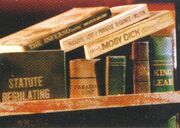
Khan Noonien Singh's bookshelf held a copy of the Bible.
The Bible is a collection of ancient Human writings. Bound together into a book, humans of the Jewish and Christian religious traditions of Earth hold either some or all of the writings contained in the Bible as sacred. The individual writings are themselves referred to as Books of the Bible.
In Judaism, these writings are referred to as the Tanakh, or Hebrew Bible. The writings found in the Jewish traditions make up what was called the Old Testament in the Christian version of the Bible, which also included additional writings which formed what Christians referred to as the New Testament. Throughout human history, a number of different translations were made of the Bible by various faith groups, and in some cases, different writings were used as the foundation of the Biblical canon. One example of this is the Roman Catholic denomination, which included some books in the Bible that other Christian branches did not.
Noted Bibles[]
When Gutenberg perfected the printing press on Earth in the 15th century, one of the first books he mass-produced was the Bible. In later years, his work came to be known as the Gutenberg Bible. In the 23rd century, the immortal Flint was found to have an original Gutenberg Bible in his possession. (TOS episode: "Requiem for Methuselah") A century later, the faux historian Berlinghoff Rasmussen compared being close to Data to being able to examine an original Gutenberg Bible. (TNG episode: "A Matter of Time")
In 2020, a Bible was included in a time capsule that was supposed to go to Saturn aboard the USS Lewis & Clark, but the capsule was removed by Zoe Querez. (TOS novel: The Rings of Time)
In the early-2150s, Doctor Phlox once lent a King James Bible to T'Pol as an effort in helping her understand human myths. In March, 2156, she recounted a passage in the Book of Luke about a forty-day fasting in the desert by Jesus of Nazareth, while confronting Administrator T'Pau regarding Vulcan's position during the Earth-Romulan War. (ENT - The Romulan War novel: Beneath the Raptor's Wing)
One of the possessions Amanda Grayson took with her to Vulcan upon marrying Sarek was a Bible. At some point both Sarek and their son Spock had read her copy of the Bible, and Sarek was known to quote from it. (TOS novel: Probe; TOS novel: Vulcan's Forge)
Lieutenant Jasminder Choudhury owned a hard copy of the Bible. (TNG novel: Greater Than the Sum)
References to Biblical Scripture[]
The Genesis Project was named after the Book of Genesis, the first book of the Bible, which details God's creation of Earth and humanity. When Admiral Kirk asked Spock why his former lover Carol Marcus was so concerned about giving up Genesis, Spock replied that it would be helpful to know more about Genesis beyond the Biblical reference. (TOS movie: Star Trek II: The Wrath of Khan)
In 2374, Joseph Sisko quoted from the Bible: ""I have fought the good fight. I have finished the course. I have kept the faith". (DS9 episode: "Far Beyond the Stars")
The Book of Genesis also includes the story of Joseph, who was sold into slavery in Egypt. Professor Sonek Pran would relate this story to his history students, interjecting a minor character who, by answering a request for directions, enabled the story to move forward. Pran would use this as an example of how one seemingly insignificant person or act could influence history. (ST novel: A Singular Destiny)
The Klingon Gava had at some point read the Bible. She disagreed with the idea of "turning the other cheek," feeling that it would only get a person bruises on both cheeks. (TNG novel: Strike Zone)
Captain William Riker referred to the Gospel of Saint John when discussing the squale's beliefs with Ensign Aili Lavena on planet Droplet. (TTN novel: Over a Torrent Sea)
| This section is written from the Real World point of view. |
Real world[]
Numerous Trek titles draw from Biblical quotes or allusions. Most recently, the series of Star Trek: The Next Generation books that had titles beginning with "A Time to..." took their titles from the Bible's Book of Ecclesiastes:
- There is a time for everything,
- and a season for every activity under heaven
- a time to be born and a time to die,
- a time to plant and a time to uproot,
- a time to kill and a time to heal,
- a time to tear down and a time to build,
- a time to weep and a time to laugh,
- a time to mourn and a time to dance,
- a time to scatter stones and a time to gather them,
- a time to embrace and a time to refrain,
- a time to search and a time to give up,
- a time to keep and a time to throw away,
- a time to tear and a time to mend,
- a time to be silent and a time to speak,
- a time to love and a time to hate,
- a time for war and a time for peace. (Ecclesiastes 3:1-8)
External links[]
- Bible article at Memory Alpha, the wiki for canon Star Trek.
- Bible article at Wikipedia, the free encyclopedia.
